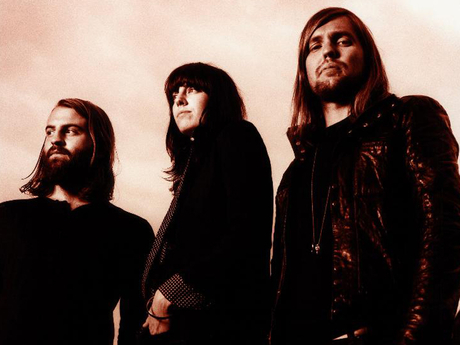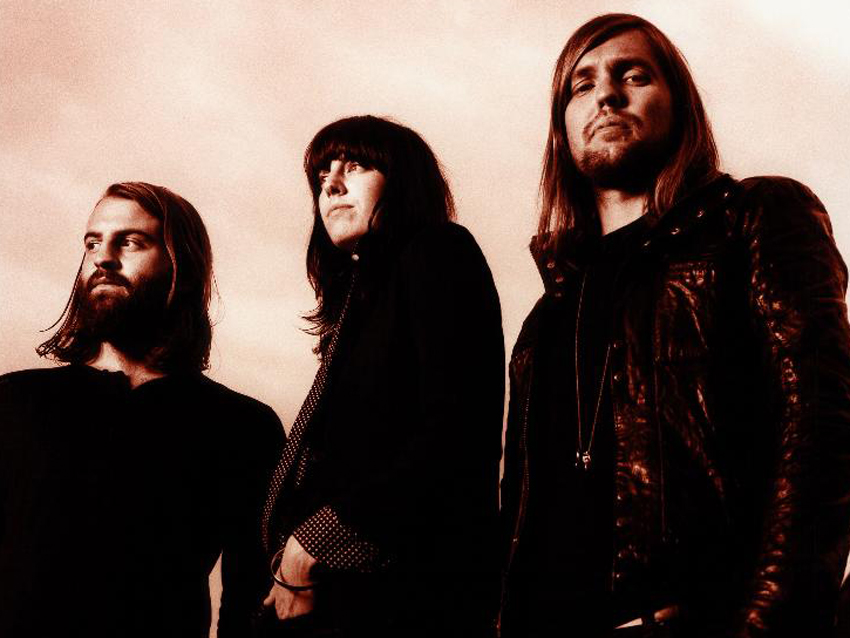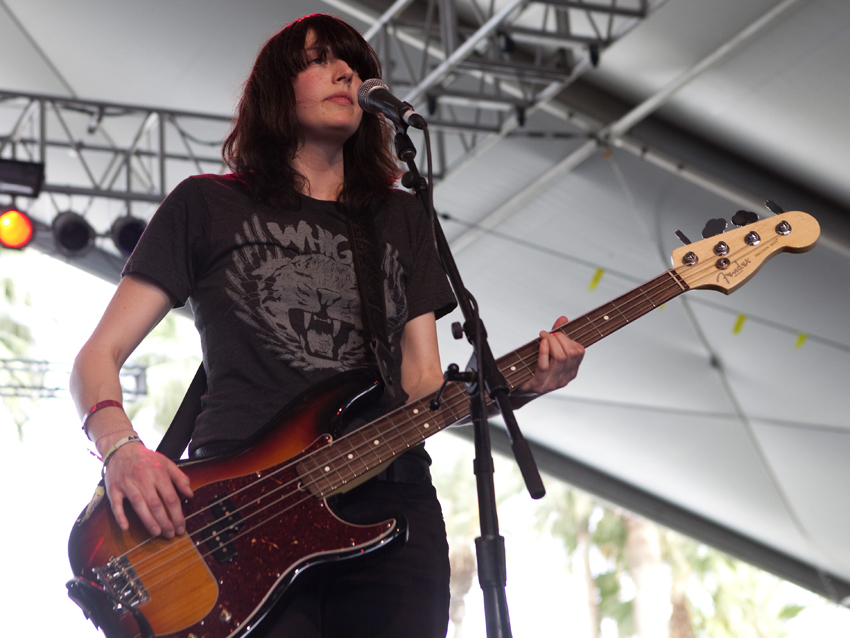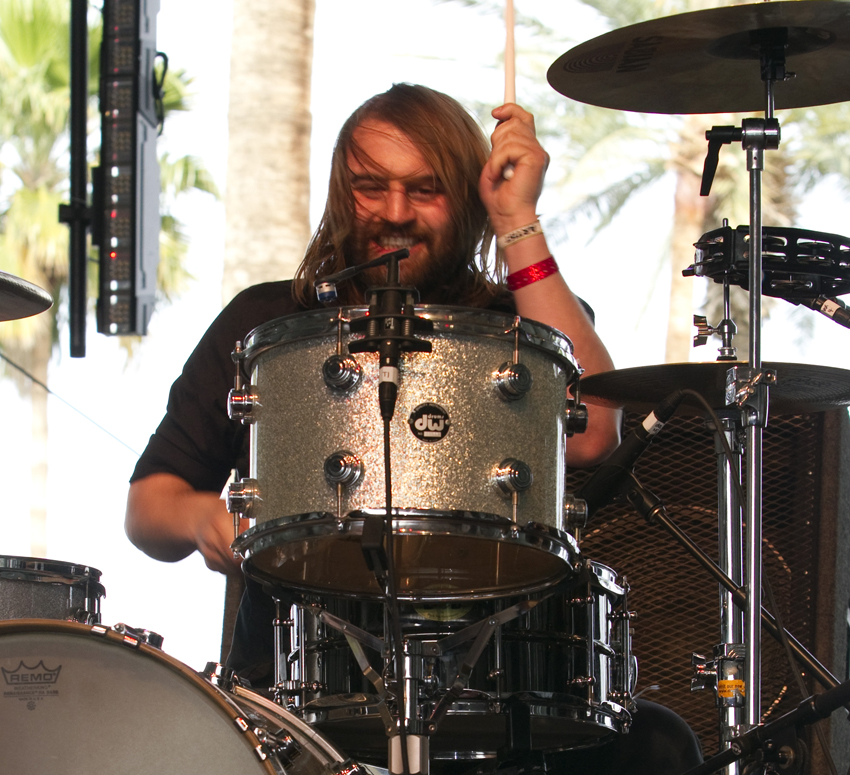
Want all the hottest music and gear news, reviews, deals, features and more, direct to your inbox? Sign up here.
You are now subscribed
Your newsletter sign-up was successful

Band Of Skulls (Matt Hayward, Emma Richardson and Russell Marsden) release their sophomore album, Sweet Sour, next February. Wait for it!
"The first time I heard about us being a 'buzz band' was when you mentioned it to me for that first MusicRadar interview," says Band Of Skulls singer-guitarist Russell Marsden.
"That was a strange time, actually. It was nice to know that people were talking about us rather quickly, but I really can't get caught up in hype. It starts messing you up. You start thinking about the wrong things. We've been this little band for a while now, and we like having our bubble where we can be happy. We try not to let a lot of other stuff in that can burst that bubble."
Dressed in black and sporting sunglasses, Marsden certainly looks the part of a rock star - as do his similarly attired bandmates, co-singer and bassist Emma Richardson and drummer Matt Hayward. The Southampton trio sit in the lounge of New York City's Standard Hotel, going through a couple of rounds of Pils as they discuss Sweet Sour, their raging new record (due out 21 February) that makes good on all of the fiery promises put forth on the group's 2009 debut, Darling Baby Doll Face Honey.
"I think we put a few new wrinkles on this whole rock 'n' roll thing," says Hayward. "Obviously, so much has been done already. Being original...that's a pretty sizable order in this day and age. But we've got our own sound, and it seems to work for people. I think we can stretch things out pretty far if Sweet Sour does well."
And with that, almost on cue, all three band members simultaneously knock their knuckles on the wooden table, laughing at their matched reactions.
The concept of artist development is a vanishing one. Labels don't make long-term investments in bands anymore. How do you guys feel about the position you're in right now?
Want all the hottest music and gear news, reviews, deals, features and more, direct to your inbox? Sign up here.
Matt Hayward: "Obviously, we're grateful. To have had the opportunity to make our first record is pretty remarkable, and now we've got our second album coming out - even more incredible. As they say, you only get one chance to make your first album, but the same is true for your second. There's no guidebook to tell you how to do any of this. But luckily, we're figuring it out."
Russell Marsden: "As friends and musicians, we've been together a lot longer than this incarnation. The Band Of Skulls part of things is still relatively new. We've always been in bands and played music, so we know how it feels to struggle and be under the radar, if you will. [laughs]
"Sure, we do feel lucky about where things are at for us. The industry doesn't operate as it used to where bands would make four or five albums before they broke big. The main thing to remember is that we've put in a lot of years getting to where we are. This didn't happen overnight at all. A lot of people in bands do forget that. They want shortcuts, and usually there aren't any."
Emma Richardson: "We try not to take anything for granted. But we want to enjoy all that's happening, too. It's a great privilege to have made a second album. Hopefully, we'll get to make a third and maybe a fourth. We'll see how it all goes."

Marsden with his new Gretsch Nashville Golden Anniversary. © Robb D. Cohen ./Retna Ltd./Corbis
In the writing and pre-production stages for Sweet Sour, was your agenda different than it was for the first album?
Marsden: "I think the only thing that was different was our touring life. Before we made the first record, we were playing clubs in London and places close by to where we live. Since then, we've played all over, many different types of venues. The sizes of the audiences have increased, and because of that, you do start to think differently about the music you're playing, how it affects people.
"So I don't know if our agenda was different, but we were shaped by the things we'd learned out there. You start to see what really works for audiences, and then you put that into the music you're writing. It's kind of natural. This new album was really written with our live shows in mind.
"We didn't want to alienate anybody who liked our first record, so I don't know if we 'changed' anything per se; we really just magnified certain things and pushed a few more buttons. We do have some heavier things, and a few tracks are more complicated."
Richardson: "When we play live, things get bigger and louder. Everything is 'more.' I think we brought that mindset to the new record. We wrote and performed with that bigness in our heads. We knew we wanted to make things exciting for the audiences when we played these songs live, so we performed them in the studio as if we were on stage - that made it exciting for us."
Is there any kind of set manner for how you write?
Richardson: "It's a mixture, really. It can be a riff or a lyric or a melody - anything can kick off a song. Sometimes I'll work with a drumbeat as a way of finding a melody, and then I'll show it to the others and see what they can do to it. A lot of the time, I'll have a bit of a melody, but they'll come up with really cool riffs."
Marsden: "One of new songs is called The Devil Takes Care Of His Own, and it has elements that came from all of us. It started out with Emma's melodic verse, which we then put with one of Matt's guitar riffs, and I was in the middle of everything trying to tie the song together and stick some of my parts in. It gelled."
Matt, you come up with guitar riffs, too?
Hayward: "Absolutely. I started out playing the guitar. I'm not that good at it, but I can do what I need to on the instrument. I like to sit at my drum kit and keep a four-on-the-floor beat going on the bass drum while I play the guitar and try to come up with ideas. Our songwriting is very equal between the three of us. It can be anything that one of us comes up with - if it's good, it's a song."
Marsden: "The best idea wins. If I come up with a part, but somebody else comes up with a better part, then my idea gets replaced. We don't have big egos in the songwriting. Whatever's going to make a great song, you know?
"I can't pretend to know the science behind what Emma does, nor do I understand how Matt works. But that's the beauty of what we do: none of us can figure the other person out, but it all fits together."
Hayward: "The way that songs mutate is interesting, too. If I write a guitar part, it's going to change a little bit once Russell starts playing it. He's going to bring his own style to it, and that's great. Most of the time, he makes my riffs better!" [laughs]

Richardson with her favored Fender Precision at Coachella. © Paul Hebert/Icon SMI/Corbis
Marsden: "I'm dumbing them down, really." [laughs]
You worked with Ian Davenport again - he produced the first album. What does he bring to your music? Did you think about working with somebody else?
Richardson: "No, we wanted to keep the team together. What we all did together worked the first time, so we didn't see any reason to change. Ian gets what we're trying to do. He understands our sound and knows how to help us get what we want without doing all sorts of unnecessary things. He pushes us, too. There's a lot of trust going on with our group - and that includes Ian."
How long did Sweet Sour take to record?
Marsden: "Probably about four weeks, with another 10 days afterwards. During the middle of the sessions, we played Bonnaroo, and actually, a defining moment of the record was a result of that gig. We played a lot of the new material at the show, and during the song Sweet Sour the amps were moving around, and the spring reverbs were making a lot of noise. We watched the performance back on YouTube and quite liked the sound. We thought it was weird and terrific.
"So we went back into the studio and played the song, but the only way to re-create that sound from Bonnaroo was to have Ian jump up and down on my amp. [laughs] It was great, though. It put some added life in the song that wasn't there before. So we've got the spirit of Bonnaroo on the album." [laughs]
The song also has a bit of a Led Zeppelin blues vibe to it.
Marsden: "That's Matt's influence there."
Hayward: "Led Zeppelin are a massive band with me. I'm a little funny about that, because I don't want to show that too much. I wouldn't want our songs to sound like Led Zeppelin-lite. But I do think, for any drummer, there's your top guy: John Bonham. You just can't get any better.
"Also, the thing about Led Zeppelin was, their music was just as important as the melodies or the lyrics - maybe even more so. I remember Jimmy Page once saying that you could take away the singing, and the music would still work - you'd still know what the song was. In our own way, we try to do the same thing."
On the song Bruises, the dual lead vocals are striking.
Richardson: "We're getting better." [laughs]
Emma, do you and Russell listen to X at all? The way your voices blend is similar to how John Doe and Exene Cervenka harmonize.
Richardson: "Actually, Russell and I listen to a lot of old jazz and soul singers. Personally, I would love to sound like Etta James or Ella Fitzgerald, but I haven't got the pipes. But knowing that kind of style, and being aware of the fact that we're a three-piece band and the spaces we have to fill with our voices, kind of makes me do what I do."

Drummer Hayward contributes many guitar riffs to the writing of Band Of Skulls' songs. © Paul Hebert/Icon SMI/Corbis
Marsden: "Harmonizing is a bit of an old art, I think. You can learn it, but it's something that comes naturally when you sing with one person for a while. We don't harmonize to decorate; it's a crucial part of our sound.
"I love bands that have two or three singers and they work together. The Beatles were masters at it. Even if it's a Paul song, John does something with his voice that stands out."
How do you work out who's going to carry the main lead? Does it depend on who writes the most of any given song?
Richardson: "We try not to have ownership of our songs in that way. It's more or less down to who sings the song better and puts it across."
Marsden: "The song Bruises started out with me singing it, but I just couldn't do it as well as Emma. So we flipped it around and she look the lead while I took the harmony. Much better."
You're Not Pretty But You've Got It Goin' On - now, there's a song title. [everybody laughs] And absolutely stellar guitar work!
Marsden: "Oh, thank you. We were seeing how far we could go with that. We went insane on that one. I literally pulled the strings off my guitar at the end of the solo. Ian kept telling me to go all out, and I went totally extreme."
Russell, when we spoke a couple of years ago, you were using Jazzmasters. Any changes recently?
Marsden: "The Jazzmaster was my first guitar. For the longest time, I didn't really know anything else. I wanted to develop that sound and style as much as I could, and I still do use the Jazzmaster, but last year I bought two Gretsches that I absolutely love.
"I got a White Falcon and a Nashville Golden Anniversary. For the guitar sounds on the record, those two guitars represent something of the new way. I really find them inspiring to play. They're thicker, very versatile, really good for rock stuff."
Any changes to your amps or effects?
Marsden: "I'm still using the Fender Hot Rod DeVilles, but I've added Fender Vibro-Kings. My pedalboard has grown a bit. I'm playing around with more delays. But I don't want to go too crazy with effects. I like trying to do things with my hands."
Emma, are you still a Fender Precision player?
Richardson: "Yeah. It's the first bass I ever owned. There's nothing fancy about it; it's not vintage - I would like to get a great vintage model one day. I like the weight of the Precision. My right hand sits well on it. I'm not a technical player, but I know how to work what I do, and the Precision does what I need.
"For amps, I'm using a SVT VR vintage head. Recently, I did graduate to an 8x10 speaker, which is quite nice. And I use a Bass Big Muff, along with a POG pedal. I use the POG to fill in the sound when Russell does a solo."
Marsden: "Although we both use a POG pedal. Emma got one first, and I stole it. [laughs] So we had to get another one for her."
And Matt, what kind of drum kit are you playing now?
Hayward: "I've got a Pork Pie kit, and I'm really, really pleased with it. When we first got our record deal, we each got some money to buy some equipment. Well, my dad is also a drummer, and one day he went to the music shop and took a picture of a drumset, which he sent to me.
"I thought it looked fantastic! It's got a big, 24-inch kick drum with a champagne sparkle finish - really great. Originally, I was playing a Rogers kit which belonged to my dad, and that had a champagne sparkle finish, as well. So when I saw the Pork Pie, I knew I had to check it out.
"When we were in LA, we got in touch with the Pork Pie people and went to their warehouse. A tiny, tiny little place, with only about six people working there. But they put such care into their drums. The kits sound fantastic. I've got one for the States and one for over in England. I'm so happy to be playing these drums."
Do you have touring plans figured out yet?
Hayward: "The first thing will be a tour of the States in March, I believe."
Richardson: "Before that, we'll play in Europe. We're supporting The Black Keys for a few shows, so that should be great. Then we'll come to America for five or six weeks."
Marsden: "We're going to try to play as many places as we can next year. We feel really good about the new record, and we want to turn on everybody we can. Hopefully, we'll visit some towns and cities that we haven't been to before, but we're looking forward to hitting some places we've already before. It'll be interesting to see if we've still got some friends out there."
Joe is a freelance journalist who has, over the past few decades, interviewed hundreds of guitarists for Guitar World, Guitar Player, MusicRadar and Classic Rock. He is also a former editor of Guitar World, contributing writer for Guitar Aficionado and VP of A&R for Island Records. He’s an enthusiastic guitarist, but he’s nowhere near the likes of the people he interviews. Surprisingly, his skills are more suited to the drums. If you need a drummer for your Beatles tribute band, look him up.
